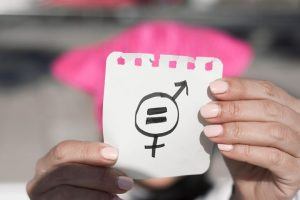Katy Guest at the TLS:
 Publishing loves a trend, and the current one is for books by and about women. As many women as possible, in some cases: books such as Can We All Be Feminists?: Seventeen writers on intersectionality, identity and finding the right way forward for feminism (Virago), edited by the activist June Eric-Udorie, anthologize many voices to better illustrate the complexities of modern “feminisms”. Eric-Udorie’s title is a response to Chimamanda Ngozi Adichie’s lecture-cum-essay We Should All Be Feminists from 2014, and in its tone, language and criticisms of feminism, it makes even Adichie seem a little old school. Its content will come as a wake-up call to some middle-aged feminists, with its focus on and nuanced understanding of “intersectionality”, and its foregrounding of marginalized voices. Many of these young women reject conventional feminism, and that, it turns out, is feminists’ fault. “Do these so-called feminists ever stop to consider”, asks Eric-Udorie, “that there are women who can’t even get through the door – whether because of racism, fatphobia, homophobia or transphobia – let alone into the boardroom?” One contributor, a trans woman called Gabrielle Bellot, addresses comments made by Adichie in an interview on Channel 4 News in 2017, that “if you’ve lived in the world as a man with the privileges that the world accords to men and then sort of change gender, it’s difficult for me to accept that then we can equate your experience with the experience of a woman who has lived from the beginning as a woman and who has not been accorded those privileges”.
Publishing loves a trend, and the current one is for books by and about women. As many women as possible, in some cases: books such as Can We All Be Feminists?: Seventeen writers on intersectionality, identity and finding the right way forward for feminism (Virago), edited by the activist June Eric-Udorie, anthologize many voices to better illustrate the complexities of modern “feminisms”. Eric-Udorie’s title is a response to Chimamanda Ngozi Adichie’s lecture-cum-essay We Should All Be Feminists from 2014, and in its tone, language and criticisms of feminism, it makes even Adichie seem a little old school. Its content will come as a wake-up call to some middle-aged feminists, with its focus on and nuanced understanding of “intersectionality”, and its foregrounding of marginalized voices. Many of these young women reject conventional feminism, and that, it turns out, is feminists’ fault. “Do these so-called feminists ever stop to consider”, asks Eric-Udorie, “that there are women who can’t even get through the door – whether because of racism, fatphobia, homophobia or transphobia – let alone into the boardroom?” One contributor, a trans woman called Gabrielle Bellot, addresses comments made by Adichie in an interview on Channel 4 News in 2017, that “if you’ve lived in the world as a man with the privileges that the world accords to men and then sort of change gender, it’s difficult for me to accept that then we can equate your experience with the experience of a woman who has lived from the beginning as a woman and who has not been accorded those privileges”.
more here.
